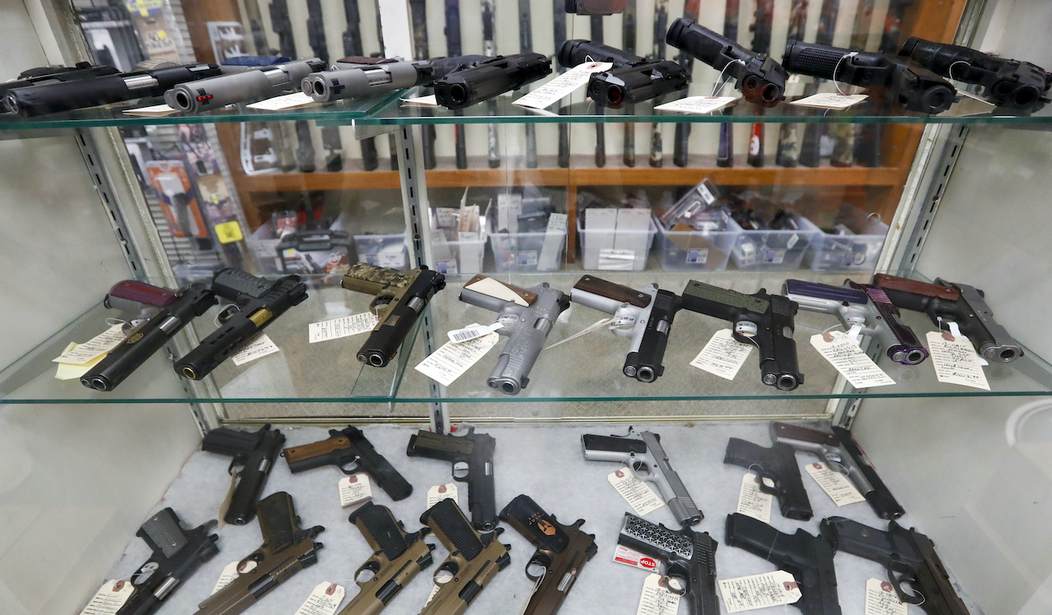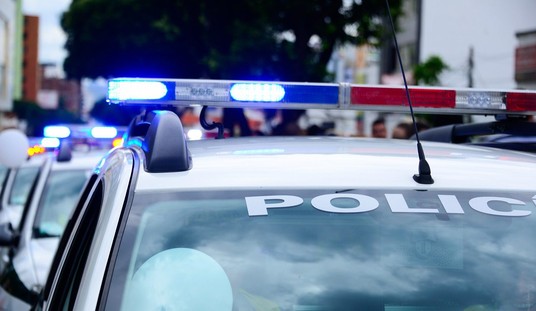The owner of Shawsheen Firearms in Massachusetts says customers will be pouring into his store on Saturday, after a federal judge ruled that Gov. Charlie Baker’s decision order gun stores closed won’t be enforced while a lawsuit against the order proceeds. Vinny Cedrone was the lead plaintiff one of two cases considered by U.S. District Judge Douglas Woodlock, and he pulled no punches when he spoke to reporters shortly after the injunction was issued.
“People are going to come out and buy guns just to friggin’ buy guns,” he said.
“Even if they didn’t want one, they’re going to come out and buy a gun just to stick it up that a**hole’s a**,” he said, referring to Gov. Charlie Baker.
If April 19th, 1775 was the “shot heard ’round the world,” then May 9th, 2020 may be known as the “sales heard ’round the world.” I wouldn’t be surprised if the state set a single day record for firearm sales, even with social distancing measures in place limiting the number of customers that can be served. And yes, Cedrone is right that some of those sales will be the financial equivalent of a giant middle finger to the Massachusetts governor, but there are also going to be plenty of customers who are there to get a firearm for self-defense rather than make a political statement. There’s a lot of pent up demand in the state, where stores were ordered to close by Baker on April 1st, after he first declared them essential and allowed them to remain open a day earlier.
Baker told reporters on Thursday afternoon that he hasn’t read the judge’s decision yet, but said that the state “will certainly comply with any kind of judicial ruling.” It’s possible that the state will appeal the decision to the First Circuit Court of Appeals, but if they do, they’re going to face an uphill battle, after Judge Woodlock’s questioning of the state’s attorneys during a hearing on Wednesday revealed some major flaws in their arguments.
From Law360:
The state has argued that the temporary nature of the ban and the other avenues to buy guns and ammo mean the plaintiffs’ constitutional rights aren’t heavily burdened. But the citizens and stores have argued that person-to-person private transactions are no replacement for gun stores, which offer the type of advice that’s important to first-time buyers as well as warranties for the products.
Kobick repeated throughout the hearing that the closures should be upheld and are narrowly tailored because they are set to end May 18.
Judge Woodlock pushed back on the “temporary” justification, saying it fails to capture the situation where deadlines have already been extended twice.
“‘Temporary and sustained’ is what I’d say at this stage, and so there’s been a good deal of time with no formal justification, and sustained, not only temporary, impingement of Second Amendment rights,” the judge said.
The availability of ammunition is a major issue as well, according to Judge Woodlock, who explained, “If you’re shooting blanks, you don’t have Second Amendment rights.”
From the record of briefs and affidavits before him, Judge Woodlock asked the state whether the availability of some handgun ammunition — albeit for smaller calibers not ideal for personal protection — at some Walmarts around the state justify the state’s “effective ban” on ammunition sales through the closure of the gun shops.
“We do contend that rights of plaintiffs are fully protected by the availability of ammunition in Walmart,” Kobick responded. “Many of the plaintiffs live near state borders. They can always go to dealers in New Hampshire.”
That last line from the state’s attorney sums up the insanity of the government’s position perfectly. The state of Massachusetts wants people to stay at home and limit their trips outside of the home to essential business only, in hopes of helping to mitigate the spread of the coronavirus. But if people want to purchase ammunition, the state says gun owners should get in their cars and drive across state lines in order to visit a gun store in the hopes of picking up a box or two of 9mm. The state cannot both encourage people to stay home and encourage people to drive to New Hampshire if they want to pick up ammunition.
Also as the judge pointed out, WalMart doesn’t sell most common handgun calibers, and they’ve stopped carrying .223 and other popular rifle rounds as well. The state may contend that the Second Amendment rights of the plaintiffs aren’t being violated because they can by some type of ammunition, but if gun owners can’t buy the ammunition they need for the firearms they own, how can they exercise their right to keep and bear the arms in their possession?
The state’s argument basically boiled down to the idea that during an emergency, the state has broad powers to take whatever steps that it deems necessary to protect the public with no justification necessary.
Defending Baker, Assistant Attorney General Julia Kobick said bold moves were needed to stop the virus in its tracks and save lives, and argued the burden on the Second Amendment is light because citizens can still acquire guns through private sales and buy ammunition at Walmart.
“In times of crisis, the government is entitled to draw lines and is entitled to deference in how it draws lines in determining what is essential for human survival,” Kobick said. “I don’t know why liquor stores were included, but gun retailers were not.”
Judge Woodlock agreed that governments are owed deference “at the macro level” when responding to emergencies, but said they aren’t freed from all responsibilities. He mused that the decision may have been related to the state’s strong liquor lobby or its political leanings on gun control.
“Now we are dealing with the micro level, and deference doesn’t fall like the mists over San Clemente,” the judge said. “It requires a sober analysis of the responsibilities of those who sell various kinds of commodities and in the absence of any contemporaneous explanation what it is that could distinguish those two … the line is drawn to burden constitution rights and not sumptuary rights.”
He added: “In the absence of real justification or a real outline of what the distinctions are, it is really difficult to give deference to concerted silence on the part of the administrators who are required to make these decisions.”
In other words, “if you can’t tell me why it’s important that gun stores be closed but places like liquor stores can remain open, I’m going to side with the folks who can tell me why it’s important to their constitutional rights that gun stores re-open.” The state simply didn’t have a good answer, and it unless it comes up with one fast, I think they’re likely to lose any appeal they might offer.









